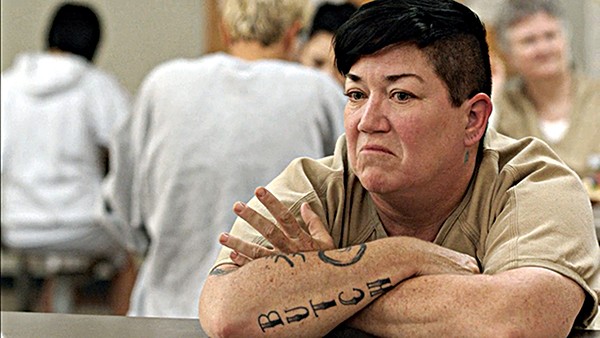Grandma is Lily Tomlin’s first leading role since 1988’s Big Business, where she co-starred with Bette Midler, but for some reason, it doesn’t feel like a comeback. Maybe it’s because Tomlin has worked constantly in TV and supporting film roles like David O. Russell’s I Heart Huckabees. Or maybe it’s because she’s just so damn good as the unreconstructed, first-wave feminist, lesbian poet Elle Reid.
We first meet her as she’s showing her much, much younger girlfriend Olivia (Judy Greer) the door. Then the 76-year-old Tomlin nails a nude, shower-crying scene like it’s not even a thing, and tops it off with a crying tooth-brushing scene.
But the shower cry is also a symptom of Grandma‘s shortcomings. How many of those scenes have you seen in your life? It aspires to be something like the distaff version of St. Vincent, last year’s Bill Murray vehicle, which cast another national treasure as a curmudgeonly oldster who finds new life and meaning when he’s forced to interact with the youngsters, but it’s a little too stiff and mannered, even when it’s trying to be wooly and crazy.
While she’s alone with her thoughts, her granddaughter, Sage (Julia Garner), knocks on her door. Sage is pregnant, and needs $630 for an abortion. She’s afraid to talk to her mom, Judy (Marcia Gay Harden), so she turns to her grandma, whom she knows won’t judge her as harshly. Or at least, Sage thinks Elle won’t judge her more harshly than she judges everybody else. Elle ran out of fucks to give a long time ago, and is not afraid to tell everyone about it. “I don’t have an anger problem. I have an asshole problem,” she says.
Elle’s low on funds until an honorarium check comes in next week, and she recently cut up the last of her credit cards and made a mobile out of the pieces. She balks at the price (“Where can you get a reasonably priced abortion around here?”), but Sage has an appointment at 5:45 p.m., so the pair set off to find someone besides the dreaded “Judge Judy” to lend them some money.
Elle rightly thinks that Sage’s boyfriend Cam (Nat Wolff) should pitch in some dough, but when they arrive at his house for the shakedown, Elle is horrified to find that he is a selfish loser. Their confrontation ends with her administering a nutshot with a hockey stick and stealing his weed from his sock drawer. And that’s actually one of the healthier interactions Elle has in the film.
Garner is not a bad actor herself, but since she has to spend the whole movie next to Tomlin, she comes off as weak and thin. Orange Is the New Black‘s Laverne Cox fares better as a tattoo-artist friend, but the only person who can come close to Tomlin’s gravitas is Sam Elliott, who plays her ex-husband Karl. Their scenes together, which serve as the emotional heart of the movie, crackle with tension.
Tomlin is every bit the equal of Meryl Streep, with whom she partnered in Robert Altman’s last film, A Prairie Home Companion, but she doesn’t have the shelf full of Oscars to show for it. Not that you should feel sorry for Tomlin, who has two Tonys, a Grammy, and seven Emmys. Maybe because she’s such a well-known comedian, she hasn’t gotten the roles that Streep has. I’m sure she’d like to hit the ultimate quad-fecta and win an Oscar, but the problem with trying to win an Academy Award this season is that you have to be better than Mad Max: Fury Road. Still, this is the first female leading role I’ve seen this year that approaches Charlize Theron’s masterful Furiosa, and Grandma, while not a great film, is much better than Still Alice, which brought home the naked gold man for Julianne Moore last year. But really, it’s just great to see Tomlin in the driver’s seat again.

